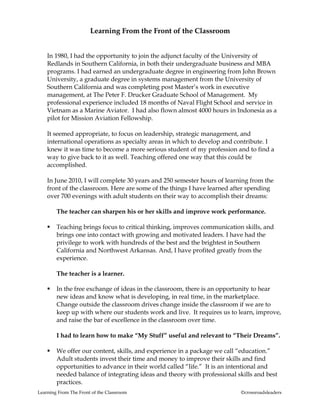Learning From The Front Of The Classroom
- 1. Learning From the Front of the Classroom In 1980, I had the opportunity to join the adjunct faculty of the University of Redlands in Southern California, in both their undergraduate business and MBA programs. I had earned an undergraduate degree in engineering from John Brown University, a graduate degree in systems management from the University of Southern California and was completing post MasterŌĆÖs work in executive management, at The Peter F. Drucker Graduate School of Management. My professional experience included 18 months of Naval Flight School and service in Vietnam as a Marine Aviator. I had also flown almost 4000 hours in Indonesia as a pilot for Mission Aviation Fellowship. It seemed appropriate, to focus on leadership, strategic management, and international operations as specialty areas in which to develop and contribute. I knew it was time to become a more serious student of my profession and to find a way to give back to it as well. Teaching offered one way that this could be accomplished. In June 2010, I will complete 30 years and 250 semester hours of learning from the front of the classroom. Here are some of the things I have learned after spending over 700 evenings with adult students on their way to accomplish their dreams: The teacher can sharpen his or her skills and improve work performance. ’é¦ Teaching brings focus to critical thinking, improves communication skills, and brings one into contact with growing and motivated leaders. I have had the privilege to work with hundreds of the best and the brightest in Southern California and Northwest Arkansas. And, I have profited greatly from the experience. The teacher is a learner. ’é¦ In the free exchange of ideas in the classroom, there is an opportunity to hear new ideas and know what is developing, in real time, in the marketplace. Change outside the classroom drives change inside the classroom if we are to keep up with where our students work and live. It requires us to learn, improve, and raise the bar of excellence in the classroom over time. I had to learn how to make ŌĆ£My StuffŌĆØ useful and relevant to ŌĆ£Their DreamsŌĆØ. ’é¦ We offer our content, skills, and experience in a package we call ŌĆ£education.ŌĆØ Adult students invest their time and money to improve their skills and find opportunities to advance in their world called ŌĆ£life.ŌĆØ It is an intentional and needed balance of integrating ideas and theory with professional skills and best practices. Learning From The Front of the Classroom ┬®crossroadsleaders
- 2. There are different learning strategies and educational outcomes for the three student groups, or markets, that we serve at JBU: ’é¦ Resident Undergraduates (Potential leaders): Young adults come from across the country and overseas to learn and to grow. The campus location maintains the core of excellence in educational resources and culture. Today, campus based education has higher overhead expenses coupled with a slower rate of growth. ’é¦ Non-Resident Undergraduates (Emerging Leaders): Motivated adult learners meet closer to their home and workplace and desire to create greater opportunities for themselves. This provides the University with a lower cost delivery system and higher growth in revenue and margins as it extends its mission. ’é¦ Non-Resident Graduate Students (Experienced Leaders): These are professionals with influence taking their skills and experience to the next level. This is also provides a lower cost delivery system for JBU, yielding higher margins, and has a high potential for revenue growth as it extends its brand into the business and professional community. Our students desire and deserve the best that we can give them. ’é¦ We have the opportunity to give of ourselves from deep wells of education, experience and ideas gathered across our years of contact with outstanding professors, organizations and the people who lead them. ’é¦ We have the responsibility to deliver a learning experience that exceeds the expectations of our students in both excellence and value to them. Great teachers have helped us along our journey of life, and we should do the same for our students. We are fortunate to be living and working in one of the fastest growing areas in the country. The demand for excellent education through the JBU brand is very strong and many opportunities are before us. The table that appears below summarizes key differences in our approaches in crossing the bridge from undergraduate to graduate education. Learning From The Front of the Classroom ┬®crossroadsleaders
- 3. Crossing the Bridge to Graduate Education Non-Resident Undergraduates Non-Resident Graduate Students ( JBU Advance Program) (JBU Professional and Graduate Studies) ’é¦ Theory and content delivery drive ’é¦ Theory and content framing drive classes (75% of class time) classes (40% of class time) ’é¦ Limited feedback and exchange ’é¦ Expanded feedback, exchange and student led participation ’é¦ Outside readings, lecture related, to ’é¦ Extensive outside readings, not always supplement content. lecture related, to expose the student to a wide range of thinking and ideas. ’é¦ Lecture as a focus of content delivery ’é¦ Lecture as framing of ideas for application and discussion. ’é¦ Accountability through quizzes, exams, ’é¦ Accountability through student led topical paper writing presentations, journals, book reviews, summaries and solution paper writing. ’é¦ Increased knowledge base ’é¦ Expanded base of knowledge and greater understanding of ideas ’é¦ Skills developed through illustrations ’é¦ Dramatically increased skills and best and learning applications practices through models, case studies and participation ’é¦ We influence character ’é¦ We help to develop character, vision, and judgment ’é¦ ŌĆ£What do I need to know to prepare ’é¦ How will I better contribute to my for the world out there?ŌĆØ work and to others in the world out there?ŌĆØ Ron Maines Learning From The Front of the Classroom ┬®crossroadsleaders
- 4. January 2007/Revised August 2009 Learning From The Front of the Classroom ┬®crossroadsleaders



